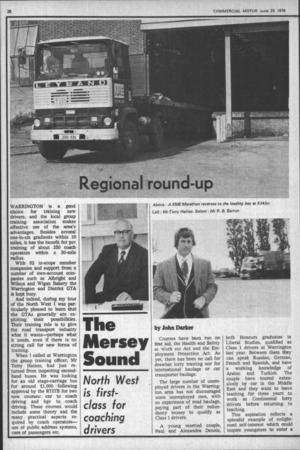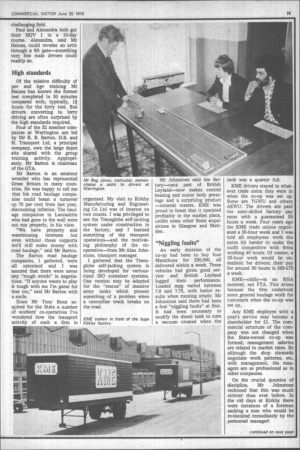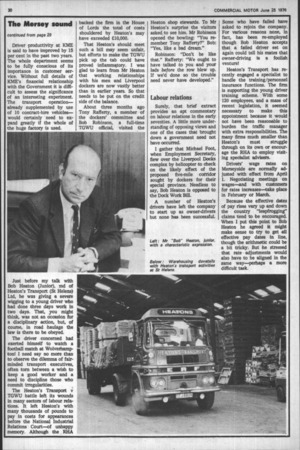The Mersey Sound
Page 30

Page 31

Page 32

If you've noticed an error in this article please click here to report it so we can fix it.
WARRINGTON is a good choice for training new drivers, and the local group training association makes effective use of the area's advantages. Besides several one-in-six gradients within 10 miles, it has the benefit for psv training of about 250 coach operators within a 30-mile radius.
With 52 in-scope member companies and support from a number of own-account companies such as Albright and Wilson and Wigan Bakery the Warrington and District GTA is kept busy.
And indeed, during my tour of the North West I was particularly pleased to learn that the GTAs generally are exploiting their possibilities. Their training role is to give the road transport industry what it wants—perhaps what it needs, even if there is no strong call for new forms of training.
When I called at Warrington the group training officer, Mr Terry Haines, had just returned from inspecting secondhand buses. He was looking for an old stage-carriage bus for around £1,000 following approval by the RTITB for two new courses: car to coach driving and hgv to coach driving. These courses would include some theory and the many practical 'aspects required by coach operators— use of public 'address systems, care of passengers etc. Courses have been run on first aid, the Health and Safety at Work etc Act and the Employment Protection Act. As yet, there has been no call for drawbar lorry training nor for international haulage or car transporter haulage.
The large number of unemployed drivers in the Warrington area has not discouraged some unemployed men, with no experience of road haulage, paying part of their redundancy money to qualify as Class 1 drivers.
A young married couple, Paul and Alexandra Dennis, both Honours graduates in Liberal Studies, qualified as Class 1 drivers at Warrington last year. Between. them they can speak Russian, German: French and Spanish, and have a working knowledge of Arabic and Turkish. The couple have toured extensively by car in the Middle East and they want to leave teaching for three years to work as Continental lorry drivers before returning to teaching.
This aspiration reflects a splendid example of enlightened self-interest which could inspire youngsters to enter a challenging field.
Paul and Alexandra both got their HGV I in a 10-day course. Alexandra, said Mr Flaines, could reverse an artic through a 9ft gate—something very few male drivers could readily do.
High standards
Of the relative difficulty of psv and hgv training Mr Haines has known the former test completed in 30 minutes compared with, typically, hours for the lorry test. Bus drivers converting to lorry driving are often surprised by the high standards required.
Four of the 52 member companies at Warrington are led by Mr R. B. Barton. H.B. and H. Transport Ltd, a principal company, own the large depot site shared with the group training activity. Appropriately, Mr Barton is chairman of the GTA.
Mr Barton is an amateur wrestler who has represented Great Britain in many countries. He was happy to tell me that •his road haulage companies could boast a turnover up 70 per cent from last year, discounting inflation. The haulage companies in Lancashire who had gone to the wan were not run properly, in his view.
"We have property and warehousing interests but even without these supports we'd still make money with road haulage," said Mr Barton.
The Barton road haulage companies, I gathered, were all unionised and I was assured that there were never any "rough words" in negotiations. "If anyone wants to play it tough with me I'm game for that too," said Mr Barton with a smile.
Since Mr Tony Benn acquired for the State a number of workers' co-operatives I've wondered how the transport activity of such a firm is organised. My visit •to Kirkby Manufacturing and Engineering Co Ltd was of interest on two counts. I was privileged to see the Transglobe self-jacking system under construction in the factory, and I learned something of the transport operations—and the motivating philosophy of the cooperative—from Mr Alan Johnstone, transport manager.
I gathered that the Transglobe self-jacking system is being developed for varioussized ISO container systems. One version may be adapted for the "rescue" of massive army tanks which present something of a problem when a caterpillar track breaks on the road. Mr Johnstone said the factory—once part of British Leyland—now makes central heating and motor body pressings and a surprising product —mineral waters. KME was proud to boast that it operated profitably in the market place, unlike some other State acquisitions in Glasgow and Meriden.
"Niggling faults"
An early decision of the co-op had been to buy four Marathons for £50,000, all delivered within a week. These vehicles had given good service and British Leyland logged their performance. Loaded mpg varied between 7.6 and 7,75, with better results when running empty. Mr Johnstone said there had been a few "niggling faults" at first. It had been necessary to modify the diesel tank to cure a vacuum created when the tank was a quarter full.
KME drivers stayed in whatever trade union they were in when the co-op was set up. Some are TGWU and others AEWLJ. The drivers are paid the semi-skilled factory pay rates with a guaranteed 50 hours a week. Four years ago the KME trade unions negotiated a 35-hour week and I was told all employees work the extra bit harder to make the outfit competitive with firms working 40 hours. Of course, a 35-hour week would be unrealistic for drivers; their pay for around 50 hours is £65-£70 a week.
KME—oddly--is an RHA member, not ETA. This arises because the firm undertook some general haulage work for customers when the co-op was set up., Any KME employee with a year's service may become a shareholder for £1. The commercial structure of the company was not changed when the State-owned co-op was formed; management salaries are related to market rates. So although the shop stewards negotiate work patterns, etc, with management, the managers are as professional as in other companies.
On the crucial question of discipline, Mr Johnstone reckoned that this was much stricter than ever before. In the old days at Kirkby there were instances of a foreman sacking a man who would be re-instated immediately by the personnel manager! Driver productivity at KME is said to have improved by 15 per cent in the past two years. The whole department seems to be fully conscious of its importance in customer service. Without full details of ICME's financial relationship with the Government it is difficult to assess the significance of an interesting experiment. The transport operation— already supplemented by use of 10 contract-hire vehicles— would certainly need to expand greatly if the whole of the huge factory is used.
Just before my talk with Bob Heaton (Junior), md of Heaton's Transport (St Helens) Ltd, he was giving a severe wigging to a young driver who had done three days work in two days. That, you might think, was not an occasion for a disciplinary action, but, of course, in road haulage the law is there to be obeyed.
The driver concerned had exerted himself to watch a football match at Wolverhampton! I need say no more than to observe the dilemma of fairminded transport executives, often torn between a wish to keep a good worker and a need to discipline those who commit irregularities.
The Heaton's Transport v TGWU battle left its wounds in many sectors of labour relations. It left Heaton's with many thousands of pounds to pay in costs for appearances before the National Industrial Relations Court—of unhappy memory. Although the RHA backed the firm in the House of Lords the total of costs shouldered by Heaton's may have exceeded £10,000.
That Heaton's should meet such a bill may seem unfair, but efforts to make the TGWU pick up the tab could have proved inflammatory. I was glad to learn from Mr Heaton that working relationships with his men and Liverpool dockers are now vastly better than in earlier years. So that needs to be put on the credit side of the balance.
About three months ago Tony Rafferty, a member of the dockers' committee and Bob Robinson, a full-time TGWU official, visited the Heaton shop stewards. To Mr Heaton's surprise the visitors asked to see him. Mr Robinson opened the bowling: "You remember Tony Rafferty?" Bob: "Yes, like a bad dream."
Robinson: "Don't be like that." Rafferty: "We ought to have talked to you and your lads before the row blew up. If we'd done so the trouble need never have developed."
Labour relations
Surely, that brief extract provides an apt commentary on labour relations in the early seventies. A little more understanding of opposing views and one of the cases that brought down a government need not have occurred.
I gather that Michael Foot, when Employment Secretary, flew over the Liverpool Docks complex by helicopter to check on the likely effect of the proposed five-mile corridor sought by dockers for their special province. Needless to say, Bob Heaton is opposed to the Dock Work Bill.
A number of Heaton's drivers have left the company to start up as owner-drivers but none has been successful. Some who have failed have asked to rejoin the company. For various reasons none, in fact, has been re-employed though Bob Heaton accepts that a failed driver set on again could tell his mates that owner-driving is a foolish venture!
Heaton's Transport has recently engaged a specialist to handle the training/personnel insurance functions. The firm is supporting the young driver training scheme. With some 120 employees, and a mass of recent legislation, it seemed necessary to make this appointment because it would not have been reasonable to burden the traffic manager with extra responsibilities. The many firms much smaller than Heaton's must struggle through on its own or encourage the RHA to employ visiting specialist advisers.
Drivers' wage rates on Merseyside are normally adjusted with effect from April 1. Negotiating meetings on wages—and with customers for rates increases—take place in February or March.
Because the effective dates of pay rises vary up and down the country "leapfrogging" claims tend to be encouraged. When I put this point to Bob Heaton he agreed it might make sense to try to get all effective pay dates in line, though the arithmetic could be a bit tricky. But he stressed that rate adjustments would also have to be aligned in the same way—perhaps a more difficult task.




















































































